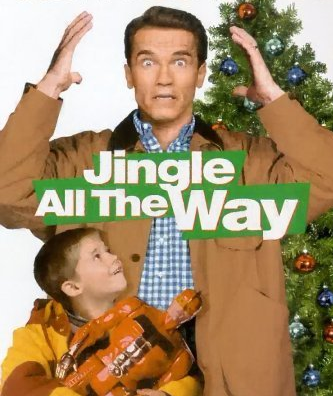Black Friday Spoofs Have Come True, But You Don't Have to Join the Madness
by Addison Del Mastro | November 20, 2012

I’ve always loved the tradition of sitting down in the family room, next to a warm fire, and enjoying a Christmas movie. Over the years, I’ve watched everything from A Charlie Brown Christmas to National Lampoon’s Christmas Vacation. When I was little, one particular movie was my favorite: a relatively obscure 1996 comedy caper, Jingle All the Way.
Jingle All the Way is about an overworked father, Howard Langston (played by Arnold Schwarzenegger), who sells mattresses. He’s so used to making sales calls that, in the first few minutes of the film, he finishes a call with his wife, “And don’t forget, you’re my number one customer.” To make up for being a largely absentee father, he promises to buy his son that year’s “must-have” gift, a superhero action figure called “Turbo Man.”
The film follows Langston as he frantically goes out on Christmas Eve to find the action figure, having forgotten to do so earlier. One segment of the film takes place in a mall (aptly filmed at Minnesota’s Mall of America) where Langston tries, with no luck, to find Turbo Man.
During that segment, three over-the-top scenes are meant to parody the holiday shopping rush. In one, a huge crowd of customers busts through the doors of a shop and tramples down one of the employees. In another scene, a frenzied customer sprays mace in Langston’s face to prevent him from getting one of the last available Turbo Man figures. Lastly, a store owner hands out lottery balls to distribute the remaining figures, and a fight ensues as the customers punch and pummel one other to get the balls.
In the late 1990s, as a little kid, I found all of this quite funny. But last Christmas, when I watched the film again, it wasn’t so funny. In fact, it had taken on a sober, even prophetic tone. Why? Because by December 2011, all three of those scenes had become real-life Black Friday incidents.
The most tragic, of course, is the 2008 trampling to death of a Walmart employee. In that incident, the mob of shoppers actually crashed through the doors before the store had even opened. The victim, a temporary holiday employee, died of cardiac arrest. Other reports from the day said that even the emergency workers doing CPR on the victim were stepped on by the crowd.
Then there’s the Black Friday 2011 mace incident (also at Walmart) where a woman sprayed mace and injured 20 people while trying to get at a pile of Xbox 360 game consoles. According to a CBS report, a Walmart spokesman said, “It was an unfortunate situation but we’re glad everyone is okay.” Evidently, 20 minor injuries equals “everyone is okay.”
And finally, there was the 2006 “prize-filled balloons” incident, when a mall in Torrence, California, released 500 balloons filled with gift cards from above, to be caught by a crowd of thousands of shoppers. The result was a melee in which nine people received minor injuries and one elderly woman was hospitalized.
And so, a movie that had been one of my holiday favorites went—in just 15 years—from a parody of frenzied shopping to an eerie prediction of Black Friday insanity. I had been aware of all the real-life violence before I re-watched Jingle All the Way, but it was only when I compared the film to real life that I realized the depth to which our “holiday season” has sunk.
These days, it seems as though such violence is just a cost of doing business—or worse, a sort of entertaining sideshow. It has gotten so bad that, four years after a man was trampled to death on Black Friday, Target is opening at 9 p.m. on Thanksgiving evening. I know that at that time, I will be semi-passed out on a couch, watching a movie or talking with family. I can’t imagine why anyone would go shopping then—but I also can’t imagine why a business would promote such a thing.
In many ways, I’m at a loss for words. On that fateful day in 2008, we didn’t simply face another news story. We faced a fundamental societal question: Are we prepared to concede that human life itself can be sacrificed to consumerism? Are we prepared to risk the joy of the holiday season to a newer, bigger television—and possibly to death? Are we willing to redefine the meaning of happiness?
We’ve all heard the “buy nothing, don’t go shopping” mantra. And that’s exactly what I’ll be doing. But I won’t be sitting idly.
What about playing that new board game from 10 years ago that you never opened? Or watching a favorite TV or film classic? Or the simple pleasure of simply being with loved ones at a special time? There is a place for material goods, and a place for shopping—but if we continue on our current path, we risk forgetting those less expensive, but so much more important moments in life.
Check out New Dream's Simplify the Holidays resources for practical ways to avoid the holiday madness.
Addison Del Mastro is a student at Drew University and a guest blogger for New Dream.

